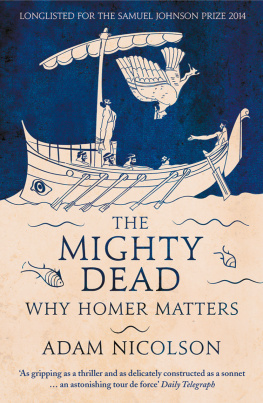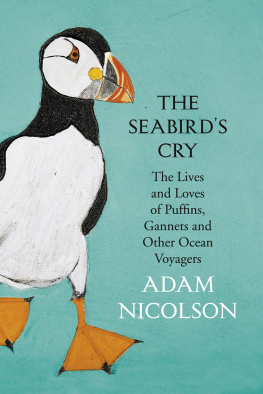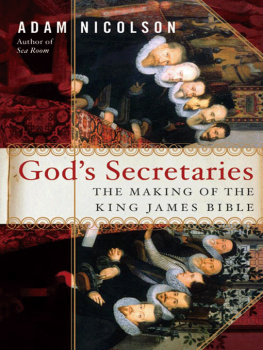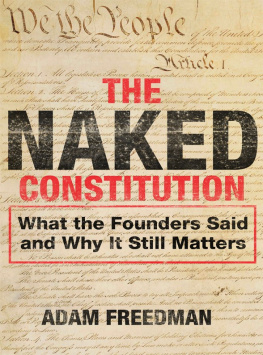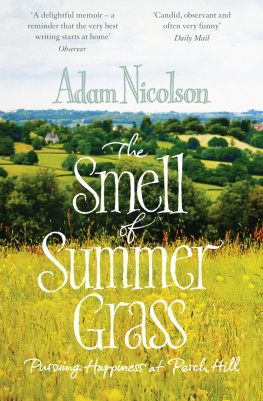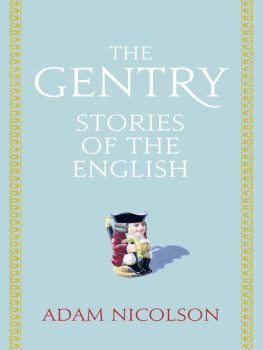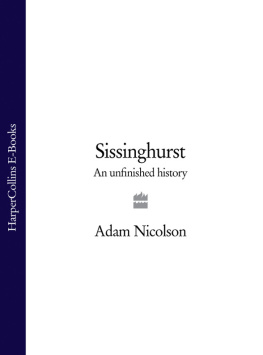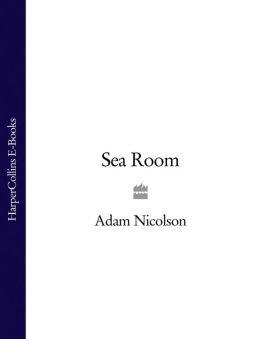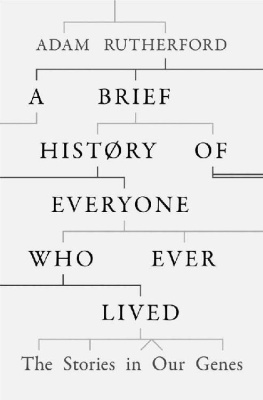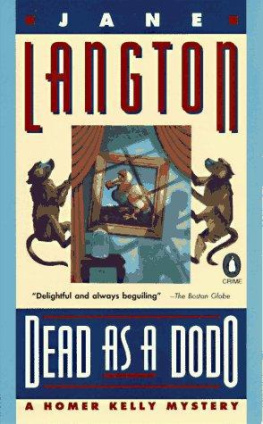Adam Nicolson - The Mighty Dead: Why Homer Matters
Here you can read online Adam Nicolson - The Mighty Dead: Why Homer Matters full text of the book (entire story) in english for free. Download pdf and epub, get meaning, cover and reviews about this ebook. City: London, year: 2014, publisher: William Collins, genre: Detective and thriller. Description of the work, (preface) as well as reviews are available. Best literature library LitArk.com created for fans of good reading and offers a wide selection of genres:
Romance novel
Science fiction
Adventure
Detective
Science
History
Home and family
Prose
Art
Politics
Computer
Non-fiction
Religion
Business
Children
Humor
Choose a favorite category and find really read worthwhile books. Enjoy immersion in the world of imagination, feel the emotions of the characters or learn something new for yourself, make an fascinating discovery.
- Book:The Mighty Dead: Why Homer Matters
- Author:
- Publisher:William Collins
- Genre:
- Year:2014
- City:London
- Rating:4 / 5
- Favourites:Add to favourites
- Your mark:
- 80
- 1
- 2
- 3
- 4
- 5
The Mighty Dead: Why Homer Matters: summary, description and annotation
We offer to read an annotation, description, summary or preface (depends on what the author of the book "The Mighty Dead: Why Homer Matters" wrote himself). If you haven't found the necessary information about the book — write in the comments, we will try to find it.
The Mighty Dead: Why Homer Matters — read online for free the complete book (whole text) full work
Below is the text of the book, divided by pages. System saving the place of the last page read, allows you to conveniently read the book "The Mighty Dead: Why Homer Matters" online for free, without having to search again every time where you left off. Put a bookmark, and you can go to the page where you finished reading at any time.
Font size:
Interval:
Bookmark:
Contents
T HIS IS TO THANK everyone who, over many years, knowingly or not, has helped me along Homers tangled paths.
George Fairhurst; Vassilis Papadimitriou; Gavin Francis; Robert Macfarlane; Ali Serle; Juliet Nicolson; Rebecca Nicolson; Aurea Carpenter; Andrew Palmer; Paul Johnston; Alexandra Chaldecott; Ivan Samarine; Jim Richardson; Oliver Payne; Claire Whalley; Koenraad Kuiper; Liz Broomfield; Mary Keen; Laura Beatty; Martin Thomas; Matthew Reynolds; Matthew Rice; Nicholas Purcell; Philip Marsden; Robert Sackville-West; Richard Klein; Sarah Longley; Sigrid Rausing; Stephen Romer; Thomas Pennybacker; Casey Du; David Sansone; Garry Fabian Miller; Charlie Burrell; Issy Burrell.
Sofka Zinovieff is the best friend, guide and companion anyone could wish for. Tim Dee took me to all sorts of Homeric places in a way that transformed my understanding of Homer. Caroline Alexander came and talked about my Homeric ideas for many vigorous and illuminating hours. David Anthony provided supremely helpful signposts to the world of the steppe.
I would particularly like to thank Kylie Richardson of Trinity Hall, Cambridge and Matt Hosty of Jesus College, Oxford for the care and trouble they took in saving me from the worst of mistakes. Needless to say, they bear no responsibility for those that remain.
At William Collins, Susan Watt, Helen Ellis, Robert Lacey and Joseph Zigmond have provided unstinting support and expertise. Arabella Pike has been the sort of editor any writer longs for: careful, considerate, encouraging, responsive, generous and above all able to summon the better book that always seems to lurk just beneath the surface. Many thanks also to Hilary Bird who compiled the index
George Capel has been my stalwart friend and ally throughout, and there is nothing I could say to thank her enough.
Above all I would like to thank Sarah and the children for putting up with Homer, who is not the easiest of house-guests, for quite so long. This book is dedicated to them.
Sarah Raven
Molly Nicolson
Rosie Nicolson
Benedict Nicolson
William Nicolson
Thomas Nicolson

Wetland: Life in the Somerset Levels
Restoration: The Rebuilding of Windsor Castle
Perch Hill: A New Life
Sea Room: An Island Life
When God Spoke English: The Making of the King James Bible
Atlantic Britain
Men of Honour: Trafalgar and the Making of the English Hero
Sissinghurst: An Unfinished History
Arcadia: The Dream of Perfection in Renaissance England
The Gentry: Stories of the English
For
Sarah Raven
Thomas Nicolson
William Nicolson
Ben Nicolson
Rosie Nicolson
&
Molly Nicolson

O NE EVENING TEN YEARS ago I started to read Homer in English. With an old friend, George Fairhurst, I had just sailed from Falmouth to Baltimore in south-west Ireland, 250 miles across the Celtic Sea. We had set off three days earlier in our wooden ketch, the Auk, forty-two feet from stem to stern, a vessel which had felt big enough in Falmouth, not so big out in the Atlantic.
It had been a ruinous journey. A mile or so out from the shelter of Falmouth we realised our instruments were broken, but we had been preparing for too long, were hungry to go, and neither of us felt like turning back. A big storm came through that night, Force 8 gusting 9 to 10, west of Scilly, and we sailed by the stars when it was clear, by the compass in the storm, four hours on, four hours off, for that night, the next day and the following night. The seas at times had been huge, the whole of the bow plunging into them, burying the bowsprit up to its socket, solid water coming over the foredeck and driving back towards the wheel, so that the side-decks were like mill-sluices, running with the Atlantic.
After forty hours we arrived. Georges face looked as if he had been in a fight, flushed and bruised, his eyes sunk and hollow in it. We dropped anchor in the middle of Baltimore harbour, its still water reflecting the quayside lights, only our small wake disturbing them, and I slept for sixteen hours straight. Now, the following evening, I was lying in my bunk, the Auk tied up alongside the Irish quay, with the Odyssey, translated by the great American poet-scholar Robert Fagles, in my hand.
I had never understood Homer as a boy. At school it was taught to us in Greek, as if the poems were written in maths. The master drew the symbols on the green blackboard and we ferreted out the sense line by line, picking bones from fish. The archaic nature of Homers vocabulary, the pattern of long and short syllables in the verse, the remote and uninteresting nature of the gods, like someone elses lunchtime account of a dream from the night before: what was that to any of us? Where was the life in it? How could this remoteness compare to the urgent realities of our own lives, our own lusts and anxieties?
The difficulty and strangeness of the Greek was little more than a prison of obscurity to me, happily abandoned once the exam was done. Homer stayed irrelevant.
Now I had Fagless words in front of me. Half idly, I had brought his translation of the Odyssey with me on the Auk, as something I thought I might look at on my own sailing journey in the North Atlantic. But as I read, a man in the middle of his life, I suddenly saw that this was not a poem about then and there, but now and here. The poem describes the inner geography of those who hear it. Every aspect of it is grand metaphor. Odysseus is not sailing on the Mediterranean but through the fears and desires of a mans life. The gods are not distant creators but elements within us: their careless pitilessness, their flaky and transient interests, their indifference, their casual selfishness, their deceit, their earth-shaking footfalls.
I read Fagles that evening, and on again as we sailed up the west coast of Ireland. I began to see Homer as a guide to life, even as a kind of scripture. The sea in the Odyssey was out to kill you at one point Hermes, the presiding genius of Odysseuss life, says, Who would want to cross the unspeakable vastness of the sea? There are not even any cities there but hidden within it were all kinds of delicious islands, filled with undreamt-of delights, lovely girls and beautiful fruits, beautiful landscapes where you didnt have to work, dream lands, each in their different way seducing and threatening the man who chanced on them. But every one was bad for him. Calypso, a goddess, unbelievably beautiful, makes him sleep with her night after night, for seven years; Circe feeds him delicious dinners for a whole year, until finally one of his men asks him what he thinks he is doing. If he goes on like this, none of them will ever see their homes again. And is that what he wants?
In part I saw the Odyssey as the story of a man who was sailing through his own death: the sea is deathly, the islands are deathly, he visits Hades at the very centre of the poem and he is thought dead by the people who love him at home, a pile of white bones rotting on some distant shore. He longs for life and yet he cannot find it. When he hears stories told of his own past, he cannot bear it, wraps his head in his sea-blue cloak and weeps for everything he has lost.
Next pageFont size:
Interval:
Bookmark:
Similar books «The Mighty Dead: Why Homer Matters»
Look at similar books to The Mighty Dead: Why Homer Matters. We have selected literature similar in name and meaning in the hope of providing readers with more options to find new, interesting, not yet read works.
Discussion, reviews of the book The Mighty Dead: Why Homer Matters and just readers' own opinions. Leave your comments, write what you think about the work, its meaning or the main characters. Specify what exactly you liked and what you didn't like, and why you think so.

